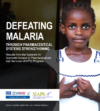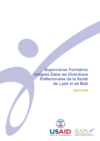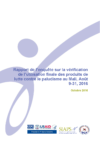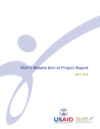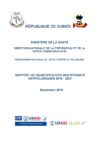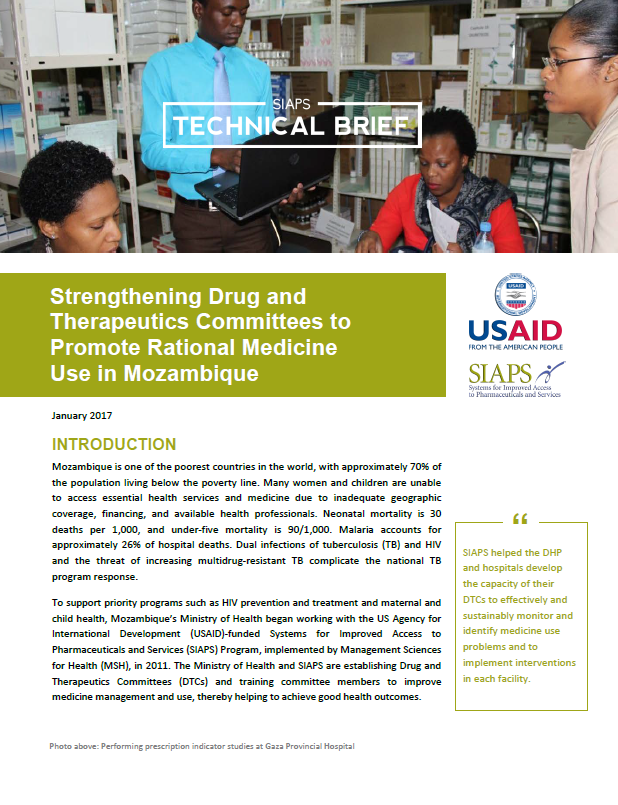SIAPS has received funding from the US President’s Malaria Initiative (PMI) to work in eight countries—Angola, Burundi, Democratic Republic of the Congo (DRC), Ethiopia, Kenya, Guinea, Mali, and South Sudan—to strengthen pharmaceutical systems for improved malaria control. This report synthesizes the pharmaceutical systems strengthening efforts of SIAPS and documents how the approach was used to support … Read more
A Clark, A Mwansasu, Angola, Burundi, Democratic Republic of Congo, Ethiopia, Guinea, Kenya, Malaria., Mali, PMI, S Doumbia, South Sudan, Technical Report
SIAPS recently published the results of its activities in eight countries (Angola, Burundi, the Democratic Republic of the Congo (DRC), Ethiopia, Kenya, Guinea, Mali, and South Sudan) to control malaria. This report summarizes systems strengthening interventions that support the prevention and treatment of malaria. With funding from the US President’s Malaria Initiative (PMI) and based … Read more
Pour lutter contre le paludisme, le Ministère de la Santé à travers le Programme national de lutte contre le paludisme (PNLP) a élaboré un plan stratégique national de troisième génération couvrant la période allant de 2013 à 2017. Il a été approuvé en février 2014 lors de la signature de l’aide-mémoire de la revue de performance … Read more
This edition of the end-use verification (EUV) survey was conducted from August 9-31, 2016 under the leadership of the National Malaria Control Program (NMCP) in the regions of Southern and Central Mali. The survey aims to help improve the availability, management, and use of pharmaceuticals and other malaria commodities at public and quasi-public health facilities … Read more
En este ejemplar : Cuál es la cantidad de medicamentos que debo mantener en el centro (puesto) de atención? ¿Qué cantidad debo solicitar periódicamente? ¿A quién debo solicitar el medicamento y los formatos oficiales para realizar el pedido? ¿Qué es lo que debo revisar al recibir los medicamentos? ¿Cómo se almacenan adecuadamente los medicamentos que fueron … Read more
Project dates: September 2011 – September 2016
Pour informer le Ministère de la santé (MS) de la Guinée des besoins du pays et assurer un approvisionnement suffisant en produits antipaludiques, il est essentiel de développer des prévisions précises et reproductibles et un plan d’approvisionnements pour les besoins futurs. A cette fin, le groupe technique – gestion des achats et des stocks (GT-GAS), … Read more
By Abraham Ayuen, Senior Communications Specialist for SIAPS South Sudan. This post originally appeared on MSH’s website. Six-year-old Yohana Peter clutched a bottle of mango juice as he waited for his medication outside a pharmacy at Al Sabah Children’s Hospital in Juba, South Sudan. Seated next to his mother on a metal bench, Yohana looked anxious. … Read more
Mozambique is one of the poorest countries in the world, with approximately 70% of the population living below the poverty line. Many women and children are unable to access essential health services and medicine due to inadequate geographic coverage, financing, and available health professionals. Neonatal mortality is 30 deaths per 1,000, and under-five mortality is … Read more
Comprehensive strategies and actions for monitoring the safety of medicines are essential to a well-functioning pharmaceutical sector. The links below highlight recent SIAPS Program work in priority and emerging health issues to strengthen health systems. SIAPS Voices series “You can’t achieve UHC without thinking about gender” In public health, when you’re designing an intervention you’re … Read more
